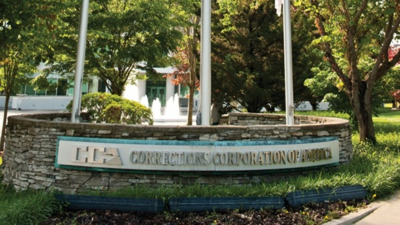Since it opened in early 2016, Tennessee’s largest prison — CoreCivic’s Trousdale Turner Correctional Center — has also been one of its most deeply troubled.
A state audit in 2017 highlighted staffing shortages and mismanagement at the facility, and family members with loved ones on the inside have consistently raised concerns about the conditions there. Reports of rampant gang activity at the prison, which is located about 50 miles northeast of Nashville, have been nearly constant. For years, CoreCivic, the Nashville-based private prison corporation that manages several Tennessee prisons, has faced similar claims of poor management at facilities around the country.
Now three years after it came online, and less than two months after state lawmakers heard testimony about violence at the facility, people close to the Trousdale prison tell the Scene that not much has changed. One lawyer who represents multiple Trousdale prisoners says inmates report that they face weeks-long lockdowns, which they see as largely driven by staffing issues.
“What the prisoners understand is basically that the place doesn’t operate without them,” the lawyer, who spoke under the condition of anonymity to protect the identity of prisoners, tells the Scene. “They’re the ones that are distributing meals three times a day. They’re the ones that are taking the trash out. They’re the ones that are keeping everything running. So there’s this very tricky relationship between the prisoners, who keep the wheels on the bus, and the guards, who have all of the theoretical power and control. I think there’s a lot of fear from the guard side that that power shift can go the wrong way basically at any time.”
As a result of that dynamic, the lawyer says, prison staff has been using what prisoners see as backdoor tactics, beyond official lockdowns, to keep the facility under control.
“They’ll do things like shut off the hot water for weeks at a time so that people just don’t go to the showers,” the lawyer says, adding that at a recent visit, a client hadn’t had a shower in more than a week.
Despite the conditions, the lawyer says, prisoners and families are often concerned about voicing complaints.
“There are an infinite number of ways that life can get worse,” she says.
One woman whose fiancé is a prisoner at Trousdale reports similar conditions. She also spoke on the condition of anonymity, fearing for the safety of her loved one on the inside.
“The [correctional officers] do not have control over that place,” she says.
She says her fiancé is essentially charged rent, under the threat of violence, by gang members who run his unit.
“He’s being extorted,” she says. “They’re making him pay to live there. The [nationwide street gang] Vice Lords, they run that unit.”
A group of men, she says, will come to her fiancé demanding money, or else they’ll be back at night.
“And they will,” she says. “He’s already gotten jumped before.”
Those sorts of stories and concerns are largely similar to ones that a group of family members expressed to Trousdale leadership in a 2017 letter, highlighting violence and a lack of medical care at the facility. The woman who spoke to the Scene recently says her fiancé has received needed mental health medication so inconsistently that he has stopped trusting what he is getting and often doesn’t take any medicine at all.
The Scene presented these claims to a CoreCivic spokesperson and received a statement from public affairs manager Rodney King. He did not respond to specific questions about how many days Trousdale has been on lockdown so far in 2019, or about the facility’s officer-to-inmate ratio.
King says CoreCivic has taken a number of steps to address the “challenges” at the facility. Among them: increasing wages and bonuses, which he says has “led to a 24 percent reduction in staff turnover from 2017” and improving the facility’s performance on audits by state and national oversight organizations.
King goes on:
“In addition to the improved scores on the TDOC audit referenced above, follow-up audits have continued to reflect the progress being made at TTCC. On the most recent audit, there were no findings related to any of the specific claims you referenced, many of which are outdated or inaccurate. Additionally, the facility currently has two full-time TDOC contract monitors onsite daily providing oversight, and CoreCivic has a full-time employee dedicated to reviewing and responding to concerns raised by inmate family members. Also, one technical point to note, the decision to place any part of a correctional facility on lockdown status is based on the need to address specific safety or security issues — it’s not related to staffing.”
The situation remains essentially unchanged. As prisoners and people close to them continue to report the same set of problems at Tennessee’s largest prison — with a listed capacity of a little more than 2,500 prisoners — officials at the for-profit corporation that manages the facility continue to say the facility only gets better by the year.





